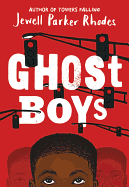
Twelve-year-old Jerome was always "the good kid": whenever possible, he "skated by. Kept [his] head low." But now that he's dead, he's famous. Jerome was shot just a few blocks from home while playing with a toy gun. Officer Moore arrived on the scene, didn't announce himself, didn't tell Jerome to put down the gun or raise his hands. He shot Jerome before the cruiser even stopped and didn't render aid or call for help as Jerome died.
By many accounts, Moore "is a good cop." His daughter Sarah--who's the same age and grade as Jerome--however, becomes doubtful: "he can't be if he killed a kid, can he?" Sarah sees what her father can't--literally--because she's the only person alive to whom Jerome is visible, with whom he can talk directly. Prodded by the 60-plus-year-old ghost of Emmett Till (whom Sarah can also see), Sarah and Jerome learn the ugly history of decades of racial and police violence, beginning with Emmett's heinous murder in 1955 at age 14. While Jerome tries to understand his own death, often aided by Emmett's gentle conversations, Sarah must come to terms with her father's "racial bias" and figure out how she might "make sure no other kids die for no reason."
Inspired to give voice to the "countless" deaths in her own lifetime due to "conscious or unconscious racism," Coretta Scott King Honoree Jewell Parker Rhodes (Ninth Ward; Towers Falling) adds a fictional name to the long list of black boys killed in police violence. Beyond easy labels of good and bad, right and wrong, Rhodes unblinkingly confronts challenging perspectives and the mutability of truth. Rhodes wrote Ghost Boys because "racial prejudices and tensions... still haunt America" and she hopes that Jerome's story might prompt "meaningful change for all youth." --Terry Hong, Smithsonian BookDragon

